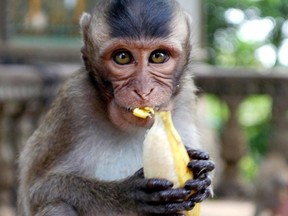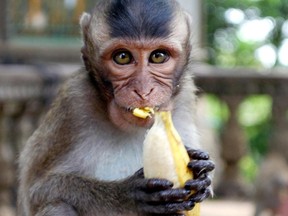U.S. Fish and Wildlife Service documents show that over 6,800 live macaques from Cambodia were shipped to Montreal since early 2023.

Article content
An animal rights group says Charles River Laboratories is running a “monkey laundering scheme” by importing thousands of live long-tailed macaques from Cambodia to Canada, transforming them into “specimens” at the company’s Quebec facilities and then re-exporting them to the U.S. where a temporary ban on such imports is in place.
Charles River Laboratories is one of the world’s largest importers and suppliers of monkeys for experimentation. It is based in Wilmington, Mass., but has several facilities in Quebec, including in Sherbrooke, Laval, St-Hubert and Senneville.
Advertisement 2
Article content
People for the Ethical Treatment of Animals (PETA) has obtained U.S. Fish and Wildlife Service documents showing that more than 6,800 live macaques from Cambodia were shipped by the company to Montreal since early 2023. The animals’ blood, tissues and bodily fluids were then shipped to Charles River labs in the U.S., thus bypassing U.S. import restrictions in place since 2022.
“Charles River is flouting the law, putting two nations at risk from dangerous pathogens and potentially violating international treaties, and federal agencies are allowing it,” said Lisa Jones-Engel, who heads PETA’s Laboratory Investigations Department. “PETA calls on U.S. and Canadian officials to stop enabling this North American monkey laundering scheme and close this absurd loophole now.”
In a letter sent to Fish and Wildlife Service this week, Jones-Engel called on the agency to intervene to “prevent further exploitation and apparent contravention of the Convention on the International Trade in Endangered Species of Wild Fauna and Flora regulations (CITES).”
The U.S. paused imports of live macaques from Cambodia in late 2022 after its Department of Justice indicted several Cambodian officials for facilitating the fraudulent export of wild-caught macaques to the United States.
Article content
Advertisement 3
Article content
The Fish and Wildlife Service conducted an undercover investigation between 2018 and 2022 in which it found that an estimated 30,000 wild-caught macaques of Cambodian origin had been falsely labelled as bred in captivity. The animals, designated as endangered on the International Union for the Conservation of Nature’s Red List of Threatened Species, were imported into the U.S. from a Cambodian monkey farm called Vanny Bio-research Corp.
Charles River Laboratories was identified as a “VIP client” of Vanny Bio-research, Jones-Engel wrote. “PETA used certificates of veterinary inspection to show that the company was using an intermediary to receive Cambodian-origin monkeys from Vanny.”
Asked for comment, a spokesperson for Charles River Laboratories said the company has not contravened any regulations.
“Charles River Laboratories complies with all Canadian and international regulations pertaining to the importation, care and treatment of animals used in our life-saving research,” Amy Cianciaruso wrote in an emailed statement to The Gazette on Friday.
Advertisement 4
Article content
PETA has raised concerns at international meetings of CITES parties regarding Cambodia’s claims of success in captive breeding of macaques.
“Notably, both Vanny and K-F Cambodia, which Charles River imports from directly, had a growth rate between 2017 and 2023 that is biologically impossible without adding (wild-caught) monkeys to the colonies,” Jones-Engel writes.
“Charles River is backdooring tens of thousands of specimens into the U.S. by exploiting regulatory loopholes, undermining the integrity of FWS import restrictions and CITES regulations. While Canada may accept the questionable accuracy of the source codes on CITES permits, this does not absolve FWS of its responsibility to scrutinize these claims independently.”
She called on the Fish and Wildlife Service to seize all Cambodian-origin monkey specimens, “as they cannot reasonably be determined to have been (derived from) legally acquired animals,” as required by U.S. federal regulations.
Records obtained by PETA through a Freedom of Information Act request show that between January and June 2023, the Fish and Wildlife Service approved 61 shipments from Canada containing 34,941 specimens derived from endangered long-tailed macaques of Cambodian origin.
Advertisement 5
Article content
“All these specimens were from Charles River Laboratories’ Canada facilities, and nearly all went to Charles River facilities in the U.S.,” Jones-Engel wrote.
PETA claims that Canada facilitated a 350 per cent increase in imports of Cambodian-origin monkeys from 2022 to 2023, with some shipments containing as many as 900 long-tailed macaques.
The Canadian Association for Biological Anthropology (CABA), whose membership includes 220 biological anthropologists from across Canada, wrote to the federal government recently to express opposition to the importation of endangered long-tailed macaques into Canada. The association, which represents most primate experts in Canada, stressed that wild primates pose a public health threat through the potential transmission of zoonotic pathogens.
“Canada must not be a safe-haven for animal import violations,” reads the CABA statement issued on Nov. 12. The organization calls on Ottawa to halt all chartered flights by Charles River Laboratories carrying imported monkeys and to increase enforcement and penalties for animal import violations.
Advertisement 6
Article content
“Wild primates, including long-tailed macaques, pose a potential threat to Canadian public health by way of transmission of zoonotic pathogens, particularly unknown pathogens which cannot be screened for by regulatory bodies such as the Canadian Food Inspection Agency,”
Three New Democrat MPs — Alexandre Boulerice (Rosemont—La Petite-Patrie), Laurel Collins (Victoria) and Matthew Green (Hamilton Centre) — also wrote to the federal government on Oct. 24 demanding action. They want the government to strengthen penalties to ensure companies don’t see fines as merely a cost of doing business, implement safeguards to verify that imported long-tailed macaques are not sourced illegally from the wild, and improve coordination between Canadian regulatory agencies
They said the information presented by PETA “highlights multiple violations of Canadian laws and international obligations, including breaches of the Canada Transportation Act and the Wild Animal and Plant Protection and Regulation of International and Interprovincial Trade Act.”
Environment and Climate Change Canada is the federal department responsible for monitoring trade to ensure wildlife imports comply with acts and regulations and meet Canada’s obligations under CITES. In a statement to The Gazette on Nov. 8, the ECCC media relations department confirmed that Charles River facilities in Laval and Sherbrooke receive shipments of long-tailed macaques.
“ECCC is aware of the ongoing investigation in the United States,” the statement said. “ECCC is closely monitoring the importation of endangered species, all necessary permits and shipments are carefully checked, all in collaboration with other federal departments and agencies involved. As of today, no non-compliance has been detected.”
Recommended from Editorial
Advertisement 7
Article content
Article content





Comments